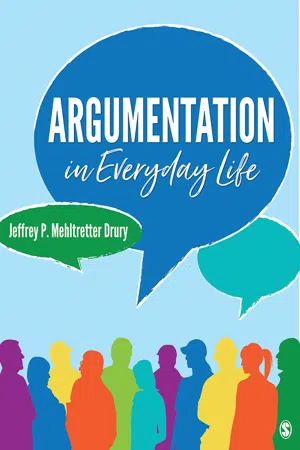
- 344 pages
- English
- ePUB (mobile friendly)
- Available on iOS & Android
Argumentation in Everyday Life
About this book
"Good coverage of concepts with understandable explanations of theory. Very user friendly with exercises to use in and out of class. Connects well with other communication classes through the application of other communication concepts to argumentation."
—Christopher Leland, Azusa Pacific University
Argumentation in Everyday Life provides students with the tools they need to argue effectively in the classroom and beyond. Jeffrey P. Mehltretter Drury offers rich coverage of theory while balancing everyday applicability, allowing students to use their skills soundly. Drury introduces the fundamentals of constructing and refuting arguments using the Toulmin model and ARG conditions (Acceptability, Relevance, and Grounds). Numerous real-world examples are connected to the theories of rhetoric and argumentation discussed—enabling students to practice and apply the content in personal, civic, and professional contexts, as well as traditional academic debates. Encouraging self-reflection, this book empowers students to find their voice and create positive change through argumentation in everyday life.
Unique resources to help students navigate this complex terrain of argumentation:
- "The Debate Situation" offers students a birds-eye view of any given debate (or exchange of arguments between two or more people) organized around three necessary components: arguments, issues, and the proposition. The visual model of the debate situation illustrates how these features work together in guiding a debate and it lays the groundwork for understanding and generating arguments.
- Easy to Use Standards for Evaluating Arguments combine a prominent argument model (named after logician Stephen Toulmin) with a standards-based approach (the ARG conditions) to test of quality of an argument. The ARG conditions are three questions an advocate should ask of an argument in determining whether or not it is rationally persuasive. These questions are best served by research but don't necessary require it, and thus they provide a useful posture for critically assessing the arguments you encounter.
- Multiple "Everyday Life" examples with an emphasis on context help students to connect the lessons more fully to their everyday life and encourages them to grapple explicitly with dilemmas arising in different contexts.
- "Find Your Voice Prompts" focus on choice & empowerment to offer strategies for students to choose which arguments to address and how to address them—empowering students to use argumentation to find their voice.
- "Build Your Skill Prompts" use objective applications to test how well students have learned the information. They offer a chance to apply the material to additional examples that students can check against the answers in Appendix II.
- Two application exercises at the end of each chapter encourage students to think critically about the content, discuss their thoughts with their peers, and apply the material to everyday situations.
Frequently asked questions
- Essential is ideal for learners and professionals who enjoy exploring a wide range of subjects. Access the Essential Library with 800,000+ trusted titles and best-sellers across business, personal growth, and the humanities. Includes unlimited reading time and Standard Read Aloud voice.
- Complete: Perfect for advanced learners and researchers needing full, unrestricted access. Unlock 1.4M+ books across hundreds of subjects, including academic and specialized titles. The Complete Plan also includes advanced features like Premium Read Aloud and Research Assistant.
Please note we cannot support devices running on iOS 13 and Android 7 or earlier. Learn more about using the app.
Information
Table of contents
- Cover
- Half Title
- Acknowledgements
- Title Page
- Copyright Page
- Brief Contents
- Detailed Contents
- Preface
- Acknowledgments
- Part I A Framework for Argumentation And Debate
- 1 Introduction to Argumentation and Debate
- 2 The Debate Situation
- 3 Argumentation Ethics & Stances
- Part II Constructing Arguments
- 4 Understanding Argument Structures
- 5 Effectively Supporting Claims
- 6 Common Argument Types
- 7 Building Effective Cases
- Part III Contesting Arguments
- 8 Generating Productive Clash
- 9 Evaluating Arguments & Cases
- 10 Evaluating Argument Types
- Part IV Applied Argumentation and Debate
- 11 Crafting Verbal And Oral Arguments
- 12 Formats For Everyday Public Argumentation
- Appendix I Formats for Academic and Competitive Debate
- Appendix II Answers to Build Your Skill Prompts
- Appendix III Glossary
- Index
- About the Author